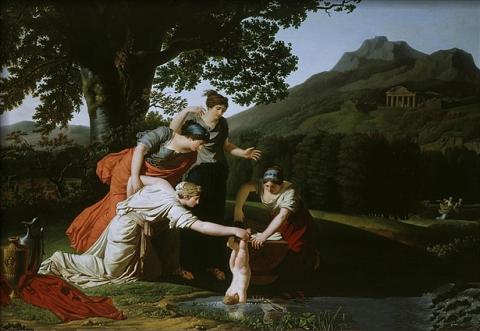Kristina Chew
October 11, 2022
As an Asian-American woman, mother of a child with autism, and a contingent faculty member, Kristina Chew has a unique perspective on the field of Classics. Here she reflects on how this background has informed and affected her experience in academia. Find Part 1 of this two-part post here.
On a hot June day in 2005, I started blogging about Charlie. As he got older, going anywhere in public became too much, so that, except when he was at school or on bike rides with Jim, Charlie went nowhere. No sitter was able to watch him, every after-school program rejected him, and Jim and I orchestrated our schedules around Charlie’s school day. My students and Jackie, my department’s academic support staffer, were unilaterally sympathetic and supportive, but everything was about rushing—rushing out of and away from meetings, lectures, and our classrooms.
I was never quite sure what would happen when I backed the car out of the driveway to take Charlie to school, or when we walked into the supermarket — whether it would be uneventful, or what I came to call an “adventure” of high emotion, wailing, and, more and more, calling 911. As it had become too clear that only physical activity allayed Charlie’s anxieties, he and Jim clocked in hours and hours, miles and miles, riding bikes all over Union County and beyond, in Jersey City, and (twice) over the George Washington Bridge into Manhattan. Charlie and I spent long afternoons walking through parks, suburban streets, parking lots, and the playgrounds that he was no longer interested in (he now towered over the elementary school-age kids on the slides). The comments other parents left on my blog in mutual understanding about Charlie’s unhappiness when a snow day cancelled school, or after yet another tense meeting with school officials, seemed my only conduit to the outside world. I was asked to write for Change.org and the Guardian, and then hired for a marketing position at a Silicon Valley company in 2013, the year that, with a “temporary residential placement” strongly recommended for Charlie, we decided to move to California. There, Charlie would be able to ride his bike year-round and be near my parents, whose several-times-a-year visits to New Jersey had ceased as my father battled cancer.
Adapting: Online Opportunities from Business, and back to Classics
“Online Marketing Manager” was a job title for the furthest thing from me. The Bay Area had a surfeit of Ph.D.s, and to go from having tenure and directing a Classics program to adjuncting seemed as great a leap as the major career change that I decided on, from academia to the technology sector, from Greek theater and Cicero to online petitions about climate change. As I wrote in the Chronicle of Higher Education, tech seemed to offer a clear and ready path to living in California and support our family.
Oedipus thought he had it all figured out too.
We flew out of Newark on Christmas Eve and, as 2014 began, I started working in an open-plan office beside an artificial lagoon. It would be a month before Charlie’s records were processed by the school district and he was able to start school, eight months before his very large file of medical records, behaviorists’ reports, and school documents was reviewed and he was approved for services from the state of California. Jim, on family leave from Fordham University, kept an utterly disoriented Charlie — he thought the way back to New Jersey was west over the Bay Bridge because that was where the San Francisco airport was — as constantly in motion riding bikes as he could. The insomnia that had turned Charlie’s final years of school in New Jersey topsy-turvy — he once did not sleep for five days and often only fell asleep at 3am — was in full force. Shortly after a social worker finally contacted us, Charlie had a crisis and was hospitalized.
καλλίστη δὲ ἀναγνώρισις, ὅταν ἅμα περιπετείᾳ γένηται, “a recognition is finest when it happens at the same time as a reversal,” Aristotle writes in Poetics (1452a33). After he was discharged, Charlie was provided with the support that he had long needed, which would set him on the path to becoming a model student at his Bay-Area autism school and, after he received his Certificate of Completion in 2019, to attend a work program for adults with developmental disabilities. Jim commuted between the Bay Area and New York City to Fordham for three years, flying across the country every other week or every week. That made it possible for me to return to teaching, which Charlie’s crisis had shown me I must do.
A friend who had followed my blogging had recommended me to Rutgers University’s Classics Department to teach online classes. I left the marketing job and, in January of 2015, was standing in my kitchen in front of my laptop and saying, Here I am in Berkeley showing you the Greek and Latin roots of “encephalitis” and “electrocardiogram,” words I’ve discussed with my son’s neurologist and the EMTs. I had never thought I would be any good teaching remotely; being a high-energy presence in the classroom was how I engaged students in conjugating and declining. But what I had learned about advocating on the Internet using social media proved highly useful in teaching students whom I would never meet. The facility with technology that had led to my daily posts about Charlie on my blog and other websites, and to work at the tech firm, made teaching fully online, asynchronous courses a task I was ready for. From the time I first taught medical terminology in the spring of 2015, enrollment in that course, and in my other fully online and asynchronous courses, zoomed into the hundreds and has stayed there. Seven years after making that first video, I am still teaching for the state university of New Jersey from 3,000 miles away.
Contingency, Survival, and Hope
Being contingent faculty means knowing you may have to go looking for a job at a time when your same-aged colleagues are becoming full professors; means living without the security and with the knowledge that you will not have it. Being the parent of a developmentally disabled adult means living not a single day without insecurity; means never waking up without fearing about the future, about what will happen to Charlie, our only child, when we are both gone.
These are two scenarios that, at some earlier time, I would have pronounced would never happen to me and were untenable, were ἀμήχανον. But loving the impossible has become my trademark. I join Antigone in saying οὐκοῦν, ὅταν δὴ μὴ σθένω, πεπαύσομαι (“well then, when I’ve not the strength, I’ll stop,” 91).
Antigone uses the future perfect (πεπαύσομαι), a tense I think in often, when contemplating what lies ahead for Charlie. I know there will be a day when Jim and I will not have been, when we are not here to take care of him. These thoughts can make my stomach clench in fear, yet foster the strength to move through the present’s at times taxing realities, be they feeling not so much a professor of an online class as a user-experience optimization specialist, or inspecting a gradebook whose hundreds of columns and rows of figures make it a dead ringer for a member-engagement data dashboard, or tucking myself through the closing door of a BART train with my bicycle, books, and backpack of grammar quizzes.
It is a gift, an extravagance and a necessity, a boon, to be able to explain to students what is the future perfect, to show them how it matters to look at every part of a word, every reduplicated consonant, temporal augment, or circumflex, and see how that changes the tense or mood or case, and how that can mean a universe of difference; to meet with students in a class, or after the semester ends, to read Greek and Latin, because the time spent together poring over a Chorus’ speech or Vergil’s ninth Eclogue forges a shared experience that can sustain, console, keep you going when you’re weary and it’s getting late. I maintain a deep gratitude to those Classicists and academics who have given me the chance to keep doing what I love to do.
Many times, when advocating for Charlie, we have seen a very ugly side of the world. Neutral words and words that you’d think would be positive (“safety”) have been wielded at us as weapons by professionals in various capacities. There have been too many times when all we could do was swallow down how we felt in the face of Charlie’s challenges, πάθει μάθος and sunt lacrimae rerum on a continuous loop in my head.
He has done so well — I am still amazed he was able to get a spot in his work program; he would not have qualified for it had he been as he was when we left New Jersey — that the uncertainties of adjuncting, the difficulty of starting over at the midpoint of my career, fade away in the face of the knowledge of what it is like for Charlie to get through his days.
Charlie’s voice is soft, and his speech consists of one-word utterances which require as careful examination as any Greek or Latin word. You have to listen closely to distinguish his b from his p (Charlie saying “park” can sound like “bike”) and to know that he drops liquids (“gasses” Charlie says, to remind Jim to take off his shades in the house and don his regular glasses) and that he uses only nouns and adjectives (“boo” ardently repeated can mean “there’s a strange blue car in the spot in the front of the house and I need it moved now”). Translating Charlie entails the same care for the minute, the tiny, that it takes to unpack what Catullus says of the sparrow being in the habit of carum nescio quid lubet iocari in c. 2, or Sophocles having the Chorus comment about Kapaneus attacking Thebes and how things can turn out otherwise than one bargains for, εἶχε δ᾽ἄλλᾳ τὰ μέν, | ἄλλα δ᾽ ἐπ᾽ ἄλλοις ἐπενώ|μα … (Antigone 138–140).
Through the odyssey of Charlie growing up and learning to be in the world, Greek and Latin have stayed with me. To survive catastrophe, you need Greek tragedy, I say to my students. The Iliad will show you where anger lies; Sappho and Catullus, love. Vergil offers some of all of these as well as, like the Odyssey, a narrative of how to survive and prepare for the rest of the journey.
Header image: Thetis Immerses Son Achilles in Water of River Styx, by Antoine Borel. Image courtesy of Wikimedia Commons.
Authors


